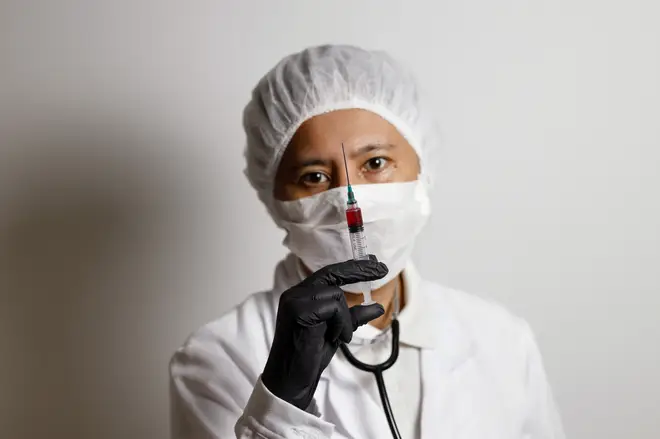
Lewis Goodall 10am - 12pm
22 April 2020, 10:46

Professor behind coronavirus vaccine reveals what testing will mean
Human testing for a coronavirus vaccine is "very exciting" but poses "big challenges", the principal investigator for the Covid-19 vaccines trials has said.
Dr Katrina Pollock, Senior Clinical Research Fellow in Vaccinology at Imperial College London, was speaking with LBC's Nick Ferrari on Wednesday morning.
The professor and her team will commence some of the first clinical trials in the UK for candidate coronavirus vaccines on Thursday.
She said it is a "very exciting time for everybody" but stressed the challenges faced when testing against a novel virus.
It comes after Health Secretary Matt Hancock announced on Tuesday that the first human trials for a vaccine from Oxford University and Imperial College will start on Thursday.
Dr Pollock told Nick Ferrari: "It's a new virus and that brings big challenges in terms of developing a vaccine, but what we're able to do is use the latest gene technology in order to speed up the first stages of developing the candidate vaccine."

She added: "But we still need to trial it in humans and those trials take time and that's what we're trying to do now.
"So compared with, for example, developing a new flu vaccine, it does have different challenges because it's a new virus, whereas for flu we would understand that virus and how to make a vaccine because of our years of experience of doing that.
"So it will take a little bit longer."
Dr Pollock commended the work already done by Professor Sarah Gilbert and her team at Oxford for helping them get to this stage so far.
Work towards the vaccine started in January, with scientists figuring out a way to sequence the virus, meaning they were able to understand it quicker.
Testing will be carried out across multiple sites, at Bristol, Southampton, Thames Valley and in Greater London, therefore people wishing to put themselves forward for the trials can do so by visiting their website.
However, there will be a number of criteria to fulfil in order to be involved in the early stage, including being in good health, being aged between 18 and 55, not pregnant and having not previously tested positive for Covid-19.
Listen & subscribe: Global Player | Apple Podcasts | Google Podcasts | Spotify
She added that more people will be needed for phases two and three of testing.
Dr Pollock said the competitive nature of academic medicine is "advantageous" as it means "the best science is what gets funded and moves forward."
She explained how the global crisis has encouraged laboratories to come together and collaborate in order to ensure the process moves along quicker, with a number of different candidate vaccines popping up around the world.
Asked when a vaccine might be made available to the public, she would not give a prospective date.
But, she said by the end of the first phase of trials, which could be just "months" away, her team would have a better understanding of when it could be made available.
"We want to have some answers about how these vaccines are behaving in the autumn."
She said her team was "confident" the vaccine could be manufactured and distributed on a large scale once trials are complete, due to the global effort and demand.
Although the £22.5 million funding they are receiving should be enough to develop and test the candidate vaccines, Dr Pollock said distributing and manufacturing would require further funding.
The vaccinologist said her team are working quicker, are under more pressure and facing greater scrutiny because of the need for a vaccine.
However, she said: "But we're trained for this and we're used to delivering these kinds of vaccine trials."
Dr Pollock said it would be "ambitious" to have a product on the shelves by the autumn or early winter.